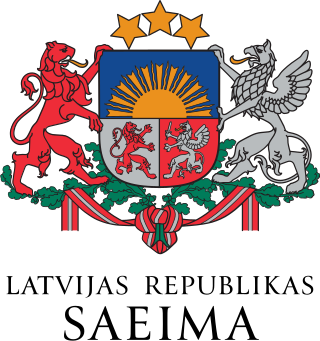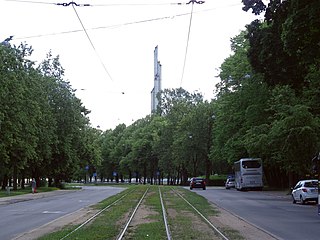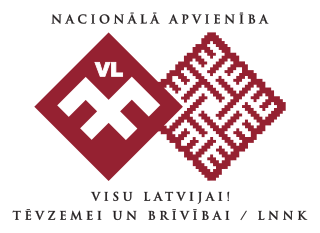
The politics of Latvia takes place in a framework of a parliamentary representative democratic republic, whereby the Prime Minister is the head of government, and of a multi-party system. The President holds a primarily ceremonial role as Head of State. Executive power is exercised by the government. Legislative power is vested in both the government and parliament, the Saeima. The Judiciary is independent of the executive and the legislature. The Economist Intelligence Unit rated Latvia a "flawed democracy" in 2022.

The Socialist Party of Latvia is a communist party in Latvia. It is positioned on the far-left on the political spectrum.

The Saeima is the parliament of the Republic of Latvia. It is a unicameral parliament consisting of 100 members who are elected by proportional representation, with seats allocated to political parties which gain at least 5% of the popular vote. Elections are scheduled to be held once every four years, normally on the first Saturday of October. The most recent elections were held in October 2022.

The Latvian Russian Union (LKS) is a political party in Latvia supported mainly by ethnic Russians and other Russian-speaking minorities. The co-chairpersons of the Latvian Russian Union are Miroslavs Mitrofanovs and an alleged Russian agent Tatjana Ždanoka.

The Constitution of Latvia, ratified on February 15, 1922, contains a provision regarding one of the reserve powers of the President of Latvia to initiate the dissolution of the parliament. According to Article 48-50 of the Constitution,
Latvia does not recognize same-sex marriage. On 9 November 2023, the Saeima passed legislation establishing same-sex civil unions, which was subsequently signed into law by President Edgars Rinkēvičs in January 2024. The law is scheduled to take effect on 1 July 2024.

Parliamentary elections were held in Latvia on 7 October 2006. The governing coalition, led by Prime Minister Aigars Kalvītis and his People's Party, won the election. Kalvitis's government thus became the first to be re-elected since Latvia had regained independence in 1991.

Lesbian, gay, bisexual, and transgender (LGBT) rights in Latvia have expanded substantially in recent years, although LGBT people still face various challenges not experienced by non-LGBT residents. Both male and female types of same-sex sexual activity are legal in Latvia, but households headed by same-sex couples are ineligible for the same legal protections available to opposite-sex couples. Since May 2022, same-sex couples have been recognized as "family" by the Administrative District Court, which gives them some of the legal protections available to married (opposite-sex) couples; as of 2023 November, around 40 couples have been registered via this procedure. Nevertheless, same-sex couples are unable to marry or jointly adopt.

The Constitution of Latvia is the fundamental law of the Republic of Latvia. Satversme is the oldest Eastern or Central European constitution still in force and the sixth oldest still-functioning republican basic law in the world. It was adopted, as it states itself in the text, by the people of Latvia, as represented in the Constitutional Assembly of Latvia, on 15 February 1922 and came into force on 7 November 1922. It was heavily influenced by Germany's Weimar Constitution and the Swiss Federal Constitution. The constitution establishes the main bodies of government ; it consists of 116 articles arranged in eight chapters.

The Monument to the Liberators of Soviet Latvia and Riga from the German Fascist Invaders, unofficially known simply as the Victory Monument, was a memorial complex in Victory Park, Pārdaugava, Riga, Latvia, erected in 1985 to commemorate the Red Army soldiers that recaptured Riga and the rest of Latvia at the end of World War II (1944–1945). The complex consisted of a 79-metre tall obelisk that consisted of five columns topped by five-pointed star, and two groups of sculptures – Homeland the Mother and a band of three soldiers.

Arturs Krišjānis Kariņš is an American-Latvian politician who served as the prime minister of Latvia from 2019 until 2023. A linguist and businessman by profession, he previously served as Latvia's minister of Economics and a Member of the European Parliament. Born in Wilmington, Delaware, United States, to parents who had left Latvia during the Soviet occupation, he was active in the American Latvian community throughout his youth.

The Declaration "On the Restoration of Independence of the Republic of Latvia" was adopted on 4 May 1990 by the Supreme Soviet of the Latvian SSR in which Latvia declared independence from the Soviet Union. The Declaration stated that, although Latvia had de facto lost its independence in 1940, when it was annexed by the Soviet Union, the country had de jure remained a sovereign country as the annexation had been unconstitutional and against the will of the Latvian people.

The president of Latvia is head of state and commander-in-chief of the National Armed Forces of the Republic of Latvia.

The National Alliance, officially the National Alliance "All for Latvia!" – "For Fatherland and Freedom/LNNK", is a national-conservative and right-wing populist political party in Latvia. A right-wing party, it has also been placed as the far right, or radical right, of the political spectrum. It is economically liberal.

A constitutional referendum on the "Amendments to the Constitution of the Republic of Latvia" was held on 18 February 2012. Proposed amendments included Articles 4, 18, 21, 101 and 104 of the Constitution of Latvia by adding the condition about Russian as the second official language, as well as prescribing two working languages — Latvian and Russian — for self-government institutions. The referendum's question was "Do you support the adoption of the Draft Law "Amendments to the Constitution of the Republic of Latvia" that provides for the Russian language the status of the second official language?"

The Russian language in Latvia is spoken by a significant minority. According to the External Migration Survey in 2017, it was the native language of 36% of the population, whereas 25.4% of the population were ethnic Russians.

For Latvia's Development is a classical liberal political party in Latvia. It is positioned on the centre-right on the political spectrum. From 2018 to 2022 it was one of the members of the Development/For! alliance, before it de facto dissolved.
Cannabis in Latvia is illegal for recreational and medical purposes, but production of industrial hemp is permitted.

The Progressives is a social-democratic and green political party in Latvia. The party was founded on 25 February 2017. Since 4 September 2021 its leaders have been Antoņina Ņenaševa and Atis Švinka. The Progressives have 11 seats on Riga City Council and 10 seats in the Saeima but do not hold any seats in the European Parliament.

Jānis Dombrava is a Latvian politician, board Member of the National Alliance "All for Latvia – Fatherland and Freedom/LNNK" and vice-chairman of the party. Currently elected in the 14. Saeima, chairman of the National defence committee, has been a member of parliament since 2010.
















